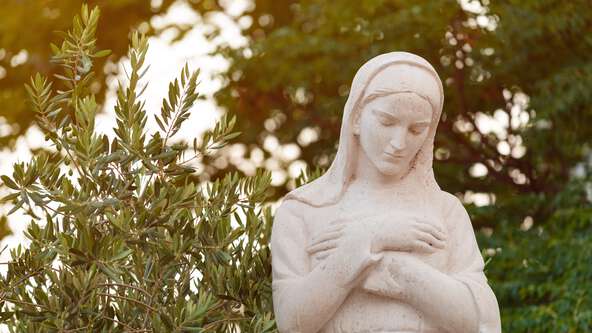Religious Traditions and Cremation Beliefs: Catholicism

Cremation was once discouraged in Catholic communities, but Church teachings have evolved. Today, cremation is allowed, including direct cremation, as long as it aligns with core Catholic beliefs about the body and resurrection.
This multi-part series explores religious beliefs about cremation. Learn the Church’s views about cremation and the customs Catholic families may follow when a loved one passes.
About Catholicism
Catholicism is the largest branch of Christianity, with over a billion followers worldwide. Guided by Scripture, tradition, and the authority of the Pope, Catholics center their faith on the life, death, and resurrection of Jesus Christ.
The Church reveres the human body, considering it a temple of the Holy Spirit. Catholic teaching holds that each person, body and soul, is made in God’s image and destined for eternal life. Today, cremation is permitted within the Church, provided it aligns with Catholic teachings on the dignity of the body and the hope of resurrection.
Acceptance Toward Cremation
The Catholic Church formally lifted its ban on cremation in 1963, allowing it as long as it was not chosen to deny belief in the resurrection of the body. This marked a significant shift from centuries of strict prohibition. The 1983 revision of the Code of Canon Law reinforced this acceptance.
If cremation is chosen, whether traditional or simple cremation, the ashes must be treated with the same respect as a body. That means placing them in a sacred location, such as a cemetery, mausoleum, or columbarium. Ashes should never be scattered, divided, or displayed at home. Proper burial is seen as an outward sign of faith in life after death. In 2023, the Church clarified that families should not scatter or divide ashes, but they can request to keep a small portion of remains in a place of “significance for the history of the deceased person.”
Catholic Funeral Customs
A traditional Catholic funeral is made up of several sacred rites designed to honor the life of the deceased, bring comfort to the bereaved, and reaffirm the Church’s belief in the resurrection and eternal life. These rites may span one to two days and typically involve close coordination with the parish priest and the funeral home.
H3: Vigil (Wake)
The vigil, often held the evening before the funeral, is a time for family and friends to gather in prayer and remembrance. This service usually occurs at a funeral home or church and includes readings from Scripture, rosary prayers, and sometimes a eulogy or shared memories from loved ones.
An open casket is common at this stage, allowing mourners to say a personal goodbye. The presence of the body reflects Catholic teaching that the body is sacred in life and death. For those who choose cremation, families may still hold a viewing with the body present before cremation takes place, or the vigil may occur with the urn present instead.
Funeral Mass
The Funeral Mass is the most solemn and central rite in the Catholic tradition. Held at a parish church, the Mass includes blessings, Scripture readings, the homily, and the celebration of the Eucharist (Holy Communion). The body or cremated remains must be present for the Mass, and they are typically placed near the altar, draped in a white pall to symbolize the person’s baptism.
A priest presides over the Mass and offers prayers for the soul's repose. During the Prayers of the Faithful, family members may participate by reading Scripture passages or offering petitions.
Committal Service
Following the Funeral Mass, the body or ashes are brought to a Catholic cemetery or columbarium for final interment. This is known as the Rite of Committal. The priest or deacon leads prayers, offers blessings over the grave or niche, and encourages the gathered mourners to commend the soul of their loved one to God’s eternal care.
A handful of earth or holy water may be placed on the casket as a final gesture. This service marks the conclusion of the Catholic funeral rites, but not the end of remembrance. Many families continue to honor the deceased through annual Masses and ongoing prayer.
Continued Remembrance and Spiritual Support
Catholics believe in the Communion of Saints, the ongoing spiritual connection between the living and the dead. The Church encourages families to pray for the souls of their loved ones, especially during All Souls’ Day each year (November 2), when parishes offer special blessings and Masses for those who have died. Catholics of Mexican descent may celebrate Dia de los Muertos to honor their loved ones.
Loved ones can also request a Mass intention at any time of year, offering prayers for the soul of the deceased. This deeply held tradition reflects the Catholic belief that our prayers can assist those who have died on their journey to eternal life.
Aligning Faith with Cremation
The Catholic Church’s acceptance of cremation (with certain caveats) offers families an option to traditional burial. Cremation is more affordable than burial and provides greater flexibility in scheduling a funeral and committal service. Prepaid cremation plans offer peace of mind. These plans allow individuals to make crucial decisions ahead of time, easing the burden on loved ones and ensuring wishes are followed.
Tulip provides simple cremation plans you can arrange by phone or online with help from our 24/7 care team. Get a free instant quote or call to learn more.